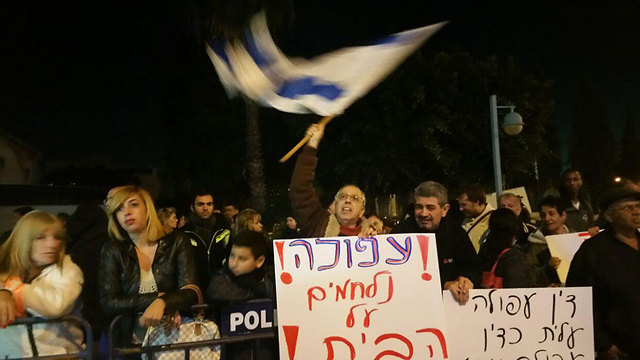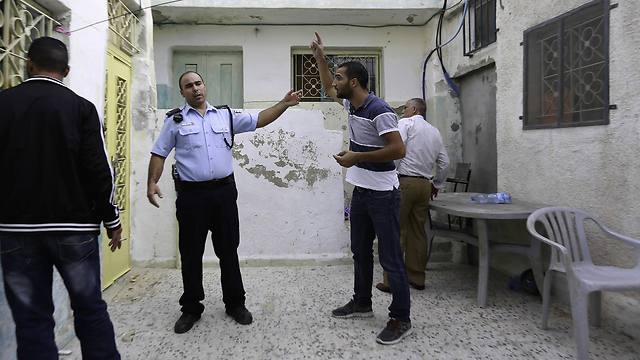
The penny finally drops for John Kerry
Op-ed: Statement from the US secretary of state that Israel must choose if it is a Jewish state or a binational state should be commended, as places like East Jerusalem and Afula show that Jews and Arabs living together can be a recipe for disaster.
John Kerry has been spewing out quite a bit of nonsense over the past two years. This column has not let him off easy. But his latest statement, for a change, belongs to a different department. He claimed Israel must decide whether it was a Jewish state, or a binational state. About 70 percent of Israelis prefer a Jewish state. It includes at least a third of Likud voters. This is the national and Zionist interest, regardless of the Palestinian position, and Israel should beware of perpetuating the existing situation and slipping into becoming a binational state only because of Palestinian intransigence.
Kerry's critics should also take note: The very use of the words "Jewish state" is a testament to the fact the speaker, even if he can be annoying at times, is a friend of Israel. Israel's haters on campuses, not just in the US, treat anyone who supports this basic concept as a colonial leper and a borderline fascist. And the fact that Kerry supports the Jewish state, and objects to Israel slipping into becoming a binational state, is commendable.
After Kerry expressed his vision of a Jewish state, Israel's embassies all over the world received a new position paper from the Foreign Ministry about the settlements. According to international law, the new document stipulates, the settlements are legal. Let's assume every word there is true. And let's assume Jews are allowed to settle in the very heart of Hebron and in upper Nablus. So what? Will this "legality" prevent the catastrophe of a binational state? And what exactly does it mean? After all, if we are talking about just one entity, then why is it that only Jews are allowed to settle in the midst of the Arab population? Arabs are also allowed to settle in the midst of the Jewish population.
This model already exists in Jerusalem. Not only do dozens or even hundreds of Jews insist on settling in the very heart of Kefar ha-Shiloah (Silwan) and Sheikh Jarrah (Shim'on Hatsadik), hundreds of Arabs have also settled in the heart of Jewish neighborhoods. We didn't need to wait for the "Intifada of Knives," in which Jerusalem is getting a big share of the suffering, to know that mixing these two populations is not working. We're not still living at the time of Homa U'Migdal (wall and tower, a settlement method used by Zionist settlers during the Arab revolt in 1936-39). There is a small Jewish state. There's no need to turn it into a big Arab state.
The fear of mixed cities
In Afula, Arabs won all of the units in the "Build Your Own Home" tender at a new neighborhood. The city's old-time residents protested. There were some disgusting displays of racism. But is the demand to give preferential treatment to old-time residents a form of racism? Let us check. The left is fighting against Jews who purposefully choose to settle in Silwan or Sheikh Jarrah. The courts, including the Supreme Court, ruled that the purchases of the homes in East Jerusalem were made legally. The Jewish settlement there is completely legal. So how dare the left protest and demonstrate? Because the old-time residents think this is a provocation. They don't want strangers.
The left is right. The Jewish settlement is not part of the "peace among nations" project. The harmony there is similar to the one in Hebron. And, in general, Israel opposes the Palestinian right of return to areas in the heart of Israel. Quite rightly so. But the supporters of the one-state solution, both on the left and right, actually support the right of return. They insist on mixing the two populations together.

What does that say about Afula? There is, as expected, a reversal of roles between the left and right. The left's claim: Racism. The old-time residents are worried of having a mixed city. They think it a foolish endeavor. They know what is happening in other places. In Nazareth Illit there is a slow change, and the new residents are coming mostly from Nazareth. The old-time residents are feeling threatened. In the US, they call it "white flight." Now, it is a well-known phenomenon in Europe. The immigrants come, while the old-timers are looking for a new place to live. They are frightened.
Before we rush to judge the old-time Afula residents, we need to remember the kibbutzim. From the moment they were founded to this very day, they have had no Arab members and have built no new neighborhoods for Arabs. The kibbutzim did not need to protest in order to implement the "Jews only" policy. This is also the situation in Arab villages. There are no Jews there. The "Build Your Own Home" tenders, by law, are only open to existing residents. The courts authorized this limitation. There is not a shred of racism here. So why should the case of the Afula residents be any different? Because, as always, someone needs to be put down. The myth that Israel is a racist state must be nurtured. Those that don't have a single African migrant, Arab or ultra-Orthodox Jew in their neighborhood, kibbutz, or town, always know how to point a finger at others. They belong to the enlightened powers of progress.
The right to self-determination encompasses within it the right of each community to maintain a specific character, a particular way of life, a community culture and its own sovereignty. Not every new member, every immigrant or every asylum seeker threatens an old community. Even in Europe, there are immigrants who were able to acclimatize and those who remained foreigners. Perhaps in the end of days, an Arab neighborhood could blossom and grow in Afula. Inshallah. At the moment, as long as there is a not-so-small minority of Israeli Arabs who support Raed Salah, it's a sure-fire way to deepen the hatred.
The Palestinians and their supporters are right about Sheikh Jarrah, just like the old-time Afula residents are right. This isn't about the left, the right, or racism. It's also not about court decisions. Not everything that gets the court's seal of approval is also in line with common sense. What the left understands in Sheikh Jarrah, it can't understand in Afula. And what the right understands in Afula, it doesn't understand in Sheikh Jarrah. This doesn't mean we need to bar any kind of Arab settlement in a Jewish city. It means that sometimes we need to use common sense. Both in Silwan and in Afula.
Please don't jump up with "what would you have said if Jews were not allowed to live in a new neighborhood in Paris?" or with the claim that this is a policy of "separate but equal," which characterized the days of segregation and discrimination against African-Americans in the US. Because each case has its own circumstances. Jews don't threaten Paris' character and there are no Jewish preachers at synagogues inciting against the French, and no one is trying to force the halacha laws on the French Republic. Not even one in a thousand. But Tariq Ramadan and Raed Salah, in France and in Israel, get quite a lot of support. And when Jews do threaten the local community, like in Sheikh Jarrah or Silwan or Hebron - then the separation is appropriate, and the mixing of populations is a recipe for trouble.
And if it's not clear already, then John Kerry is right even when it comes to Afula.
Criticism is fine, lying is not
Academics have signed yet another petition in support of "Breaking the Silence." Once again they are stepping into the same trap, because the lion's share of criticism in the past few weeks came from an initiative by Maj. (res.) Amit Deri, who recorded shocking stories from soldiers that the organization later spread far and wide. The hundreds of officers who joined him are not messengers of the right. Their line of reasoning is clear and simple: Criticism is fine, lying is not. They are in favor of freedom of speech, but against incitement. So where's the problem? Where's the danger to democracy? When one of the leaders of Breaking the Silence claims IDF soldiers are using machine guns to fire at innocent civilians on a regular basis, it's not criticism. It's blood libel. And the soldiers are sick of it.
The petition includes, as it usually does, names of academics from the Zionist left, alongside academics that support BDS. There's no chance that Benny Begin would sign the same petition as Baruch Marzel, even if they share an opinion on a certain issue. But Fania Oz-Salzberger has signed the same petition as Neve Gordon. And then they have a hard time understanding why generalizations are made about the left. They're the ones causing them, so they should not come complaining.












